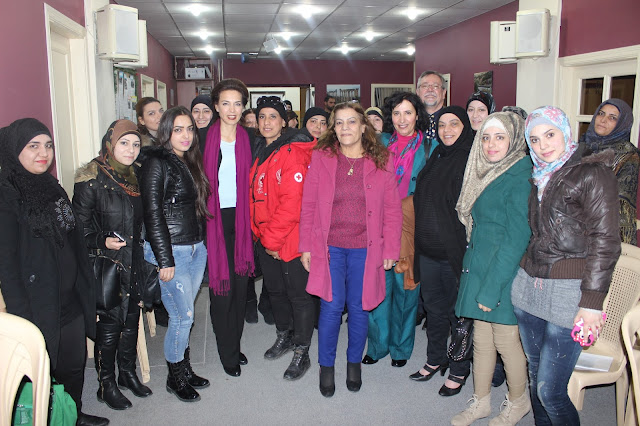"Yamuni Goes Green" is an initiative led by the Lebanese Organization for Studies and Trainings (LOST) and UNICEF aiming at raising awareness of environmental protection through workshops, door-to-door discussions, cleanliness campaigns, and hands on implementation.
LOST recruited six trainers from the village of Yamuni to train them on communication skills, municipal work, green techniques, needs assessments and surveying. After completing the workshops, LOST built the capacity of the townspeople by using door-to-door techniques to spread information. The trainers from LOST went door to door with brochures designed during the workshops and talked to the people of Yamuni one by one about environmental problems in the village. The trainers along with some volunteers also took surveys categorized by age groups; 20-25, 25-45 and 45 plus, to take into account the opinions, problems and concerns of the people. LOST conducted a total of 180 surveys and found out that the main problem; aside from the condemnable feelings of dissatisfaction, is the same throughout: water contamination and pollution. Based on results from questionnaire the trainers as well as LOST will implement Green initiative before the end of the year.

This past Tuesday, November 17th, LOST organized an opening ceremony in Yamuni under the auspices of Bashir Khodr, Governor of Baalbek-Hermel. Key stakeholders, village people, LOST representatives and UNICEF senior delegation attended to support this up and coming initiative. But before the kickoff of the launching event; LOST and the townspeople celebrated accomplishments of their own.

Sunday November 8, 2015, LOST project coordinators and associates along with more than 150 townspeople made up of Syrian and Lebanese youth, children, men and women, rich or poor gathered to clean up the main water stream of their town.
In Yamuni, this green initiative to preserve the environment and is led by local youth, volunteers and the townspeople. The day of the clean-up, the townspeople and key stakeholders were more than enthusiastic that they gathered their own groups and equipment and aided. A Syrian resident of Yamuni, Hassan Assef, came with his family and a tractor to take the trash from one place to another. Yaseen Chraif, another resident in Yamuni took care of the cost of dumpsters that will dispose of the trash. Another resident, Shalaan Chraif, rented an excavator for 80 dollars an hour, to scoop up dead trees and larger items of debris from the ground and from the river. The townspeople have passion for their village despite their attitudes towards each other and now with the knowledge of green technique and importance of keeping a clean environment, they are more willing to help in the coming processes.
Yamuni is made up a large tribal family line, Chraif, but there are more than 20 different bloodlines within the same family line. The different bloodlines in this area can't stand one another and are always blaming each other for the problems in their town.
Given the circumstances it is unbelievable that a large number of people engaged in cleaning up, especially considering the lack of a municipality in Yamuni to regulate such activities. LOST's associates positive outlook and energy saw this as a way to start mending the relationships between everyone in town. LOST started a social cohesion campaign.
LOST associates and volunteers then invited a representation from each bloodline to a dinner. The diverse mindsets were able to gather over dinner and discuss communal issues at large without judgment. These representatives became the committee in the town. They placed their personal problems aside and concluded that working together to solve a problem in order to enhance their town wouldn’t cause any harm and will only benefit everyone. The people of Yamuni went from being an idle community and staring at the problem at hand to becoming an active community and engaging with each other to tackle it.
An established trust between LOST and the townspeople was created when the people saw that LOST's presence was unbiased and the intention was to help everyone. The villagers now just wanted to be involved in one way or the other, to fix the problem. For those villagers who had money, they donated supplies to the town and for those who couldn’t donate supplies, they donated their time. Whole families came out to support the cleaning initiative of their town. The energy between the people flipped from negative to positive after LOST convened by Social Cohesion and participatory techniques.

Yamuni is known to attract locals and tourists with its remote peaceful location and family friendly parks strategically placed around natural rivers, waterfalls, and springs. Like other places in Lebanon LOST intends to support the natural environment and its need to be preserved and clean. In supporting the environment, the living standards of the people will be enhanced and relationships will be promoted.


















